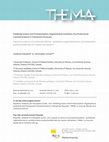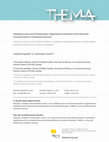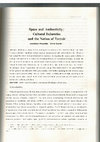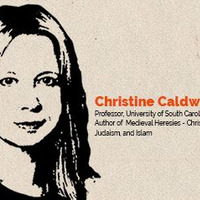Books by Jonathan Paquette

This book explores how federalism — a unique, social, and political reality that influences polic... more This book explores how federalism — a unique, social, and political reality that influences policy development and implementation — contributes to shaping cultural policies in a variety of federations. Building on the cases of a wide variety of countries, including Argentina, India and Australia, this book presents the typical and distinctive institutional challenges that federalism brings to cultural policy. In particular, this book emphasizes four dimensions: the institutional and constitutional division of cultural powers; the governmental structures of cultural policy and the dynamics of cooperation and competition established between subnational and federal powers; local cultural policies, capital cities, and the place of municipal government; and the development of subnational cultural relations. Finally, this book also acknowledges the diversity of federations and federalisms and provides a portrait of different types of relationships between federal institutions and the cultural sphere.
Peer reviewed articles and conference proceedings by Jonathan Paquette

Modern & Contemporary France
ABSTRACT Arts and heritage are the two categories essential to the fabric of cultural policies an... more ABSTRACT Arts and heritage are the two categories essential to the fabric of cultural policies and of public discourses on culture. This paper explores the duality of art and heritage in the work and life of André Malraux in the 1920s and 1930s as a window into one of many distinctive conceptions of culture in France. Art, artists, and art amateurs, are, in Malraux’s conception, the only forces that can challenge the fugacity of time and bring art to a new relevance; heritage and preservation have no such powers. This paper demonstrates Malraux’s conceptions of heritage as standard foundations for areas of French cultural policy by building on his novels and his theoretical writings on heritage in the 1930s, and looking back at his actions in Indochina in 1923, in terms of his illicit acquisition of statues from Central Asia in the 1930s, and his adventures in Djibouti and Yemen in 1934. Malraux’s conception not only gives symbolic authority to arts over heritage, but also negates the plausibility of cultural interpretation outside the world of art. This article concludes by showing how the malrucian conception of culture can help us understand some discourses and contemporary cultural controversies in France.

Cultural Trends
ABSTRACT This policy review discusses the November 2018 Report on the Restitution of African Cult... more ABSTRACT This policy review discusses the November 2018 Report on the Restitution of African Cultural Heritage: Toward a New Relational Ethics – more commonly known as the Sarr-Savoy Report – submitted to the French president. The report provides an analysis as well as a number of strategies for returning a number of cultural items and artworks to African nations that were acquired by France during the colonial era. The report also claims that its aim is to establish a new relational ethics between France and African nations through heritage work and institutions. In this policy review, we will discuss the arguments and observations contained in the report, as well as the main recommendations it makes. Additionally, we will provide an overview of responses to this report, and of the realization and implementation of the report’s recommendations halfway through its five-year timeline. Finally, we will engage with the ethical and professional dimensions that stem from this important moment – a moment that represents a turning point in current restitution debates for French museums, libraries, and archives.
Politique et Sociétés
Simard (1992) a publié une histoire des musées qui couvre et documente la période de la Nouvelle-... more Simard (1992) a publié une histoire des musées qui couvre et documente la période de la Nouvelle-France à travers ses collections, notamment des ordres religieux.

Journal of Canadian Studies, 2018
Cet article s’interroge sur le terroir comme mode de production d’un patrimoine. En s’intéressant... more Cet article s’interroge sur le terroir comme mode de production d’un patrimoine. En s’intéressant au cas du Québec, et en particulier à la région des Laurentides, cet article met en évidence les processus patrimoniaux qui sont à l’œuvre dans le mouvement du terroir. Cet article illustre comment le patrimoine et les imaginaires patrimoniaux participent à la construction récente des régions et d’une nouvelle ruralité au Québec à travers de nouvelles productions, de nouveaux produits et des itinéraires agro-patrimoniaux. Les modes de territorialisation qui sont à l’œuvre révèlent des tentatives de produire de nouveaux référents et de nouveaux marquages pour définir l’espace régional. En somme, dans une perspective critique, cet article met en évidence le caractère productif des appels au patrimoine.
This essay questions the notion of the land (terroir) as a production mode of heritage. Examining the case of Québec, and particularly that of the Laurentides area, it highlights the heritage processes at work in the “mouvement du terroir,” or land movement. It illustrates how heritage and heritage imaginations are contributing to the construction of the regions and the new rurality in Québec by means of new productions, new products or produces, and agro-heritage routes. The modes of territorialization at work reveal the attempts that are made to create new referents and new markings in order to define the regional space. In short, from a critical perspective, this essay shows the fruitful nature of the calls to heritage.

Éthique publique, 2018
Les reconfigurations sociales et politiques qui ont cours depuis quelques décennies participent à... more Les reconfigurations sociales et politiques qui ont cours depuis quelques décennies participent à la transformation des systèmes de valeurs qui s’opère actuellement dans le champ patrimonial. Le devoir de mémoire est souvent entendu comme une obligation fondamentale lorsque l’on pense le patrimoine. Or, au-delà de cette obligation essentielle à l’égard du passé, quelles sont les nouvelles obligations éthiques qui émergent dans le champ patrimonial ? Quels sont les fondements de la responsabilité éthique qui en découlent ? Cet article présente trois enjeux émergents dans le secteur patrimonial pour discuter des formes de la responsabilité auxquelles ils font appel. La reconnaissance et la représentativité du patrimoine, la durabilité du patrimoine ainsi que l’altérité du patrimoine constituent les grands débats qui nous conduisent à aborder les nouveaux discours éthiques sur la responsabilité patrimoniale contribuant à influencer la restructuration de l’agir et de la pensée professionnelle dans le secteur.
Important social and political changes that occurred decades ago now have a profound effect on common beliefs and values in the heritage sector. The duty of memory is often defined as an essential obligation when considering heritage. Going beyond this fundamental obligation to the past, we ask: what are the new forms of ethical obligations that are now emerging in the heritage sector? What are the ethical foundations for responsibility in our field? This article presents three emerging issues that highlight the question of ethical responsibility. Heritage’s capacity to be inclusive and representative, its sustainability, and its otherness all constitute fundamental questions and elements of the new ethics of responsibility that is reshaping and influencing heritage professionals and their practices.

Abstract:
When discussing positivism today, it almost systematically falls into the realm of epis... more Abstract:
When discussing positivism today, it almost systematically falls into the realm of epistemological discourse. This discursive turn is primarily the by-product of the social sciences’ now-traditional approach to positivism—a turn which has been seen as largely dismissive of positivism for its antiquated and reductionist approaches to research. Without trying to make an apologetic account of positivism, this article reframes it in its broader social and historical dimensions. In particular, this article aims to illustrate how positivism—as a social and political movement—conveyed a cultural policy. In other words, this article attempts to re-engage with the intellectual legacy of positivism to resituate its significance in cultural and artistic terms in French culture, society and beyond. By drawing on the notion of implicit cultural policy, this article retraces the steps of positivism and specifically builds a case for its influence on French cultural policy in the Third Republic.
Résumé :
Les discours contemporains sur le positivisme nous conduisent presque systématiquement à une réflexion et une discussion de nature épistémologique. Cette caractérisation limitative du positivisme a trait à la manière dont les sciences sociales se sont appropriées l’histoire de ce mouvement. Sans chercher à excuser ou à réhabiliter le positivisme au plan épistémologique, cet article tente de remettre de l’avant le positivisme en tant que mouvement social et politique tout en le resituant de son contexte historique. De manière plus spécifique, cet article met en évidence le discours social et politique du positivisme afin d’en illustrer sa politique culturelle. Autrement dit, cet article cherche à renouer avec la tradition intellectuelle du positivisme afin d’en dégager son importance et son influence artistique et culturelle, et ce, notamment sur la culture et la société française. En s’inspirant de la notion de politique culturelle implicite, cet article retrace les étapes du positivisme et développe une réflexion sur son influence sur la politique culturelle en France depuis la Troisième République.

While classic functions of Western museums have included conservation and preservation of objects... more While classic functions of Western museums have included conservation and preservation of objects and artefacts, the same cannot be said for the institutional makeup of the museum itself – which has been repeatedly torn down and rebuilt by conflicting political forces and emerging critical discourses. These transformations and consequent pressures have led to profession-related concerns and questioning around curatorial authority and the general role of professionals in the field. Through a lens of organizational symbolism, this paper analyses exhibitions from museums in Vietnam in an effort to shed light on how the social and political forces of national independence and colonialism have changed the contours of the curatorial profession and institutions in Asia. By emphasizing the significance of professional rituals and organizational symbolism in museums, this paper argues that exhibitions showing the practice and acts of professional commemoration reveal important normative aspects and elements of the professional ethos of museum professionals. In other words, these aspects illustrate the post-colonial challenge of crafting a professional identity in Southeast Asian museums, while also pointing to common profession-related concerns.

Si les fonctions classiques des musées occidentaux de conservation et de préservation des objets ... more Si les fonctions classiques des musées occidentaux de conservation et de préservation des objets et artefacts perdurent, on ne peut en dire autant de la composition institutionnelle du musée lui-même – qui a été à maintes reprises abolie et refaite au gré des forces politiques contradictoires et des discours critiques émergents. Ces transformations et les pressions en résultant ont provoqué des questionnements et une remise en cause de l’autorité des conservateurs et de leur rôle en général. À travers le prisme du symbolisme organisationnel, cet article analyse les expositions de musées au Vietnam pour montrer comment les forces sociales et politiques de l’indépendance nationale et du colonialisme ont redessiné les contours de la profession de conservateur et des institutions muséales en Asie. En insistant sur l’importance des rites professionnels et du symbolisme organisationnel dans les musées, il fait valoir que les expositions commémorant les pratiques et les actes professionnels révèlent des aspects et des éléments normatifs importants de l’éthos des professionnels des musées. Or, ces aspects illustrent le défi postcolonial que pose la construction d’une identité professionnelle dans les musées de l’Asie du Sud-Est, tout en soulevant des questions courantes relatives aux professions muséales.
In management and arts management literature, mentoring is generally associated with social repro... more In management and arts management literature, mentoring is generally associated with social reproduction and emulation, and illustrates a phenomenon that is rather conservative in nature. Rarely is mentoring associated with change. In this article, we explore how mentoring has been a force of renewal for the institutional culture of British museums. This qualitative research brings attention to mentoring as a lever for cultural change through the experience of a new cohort of museum directors—one that has translated a new vision and approach to museums and the public into reality, and has brought forward the Labour government's cultural policy ideals.
Culture and Organization, 2013

Shedding its critical flavour developed by members of the Frankfurt School, the notion ‘cultural
... more Shedding its critical flavour developed by members of the Frankfurt School, the notion ‘cultural
industries’ has slowly evolved to give an entrepreneurial taste to the cultural sector. However,
this change has rarely been problematized or examined. By exploring the cultural policy subfield
of heritage, this paper seeks to shed light on the increasing influence of entrepreneurial logics.
As such, the relationship between heritage and cultural industries is developed to illustrate how
the former is strongly influenced by the latter. Furthermore, this research uniquely employs and
develops a case for the French expression ‘terroir’. By looking at ‘terroir’ organizations and
activities, among other agricultural and craft-related practices, this paper highlights its firm
presence and association with cultural tourism while further expanding the link between cultural
industries and entrepreneurship. Overall, this paper argues that these ‘terroir’ activities shed new
light and bring to the forefront similar issues brought forth by the Frankfurt School while
emphasizing the significance of authenticity, tradition, and place.

This article aims to reintegrate the colonial history of Canada as part of the grids of analysis ... more This article aims to reintegrate the colonial history of Canada as part of the grids of analysis for understanding the evolution of its Federal cultural policy. Building on the notion of settler colonialism and its implication for Indigenous population (For the purposes of this paper, the term ‘Indigenous’ is used in place of, perhaps, more popular or familiar terms – such as ‘Aboriginal’ or ‘Native’ – in order to remain consistent with current Indigenous politics. In particular, some Indigenous scholars are reluctant to accept the label Aboriginal because they feel it is consistent with the colonial order imposed by the Canadian government [Alfred and Corntassel 2005, p. 599]). The term Indigenous also alludes to a global political awareness and to forms of alterity between different populations from North America, South America, Asia, and the Pacific. in Canada, this paper documents different transformations in cultural policy and illustrates some of its paradoxes and challenges. Building on principles developed by Indigenous scholars, this article highlights some of the components for decolonizing cultural policy in Canada. It is argued that a post-colonial cultural policy must build on the grounds of ethics (and ethos).
Culture and Organization, 2013

Culture and Organization, 2012
Professional life histories and organizational stories rarely follow the model of beginnings, mid... more Professional life histories and organizational stories rarely follow the model of beginnings, middles, and ends. Most interviews end up being subjected to what Boje (2008. Storytelling organizations. Thousand Oaks, CA: Sage) refers to as the spiral of story disorder. However, some storytelling strategies are often used by interviewees to produce a coherent projection of the self and convey a unified professional ethos. This is the role the time and space of childhood – the childhood chronotope – plays in professional life histories. Childhood is often used by storytellers to bring coherence to their organizational stories – and this is no truer than in the context of interviews. Based on interviews from museum directors, this article illustrates how the childhood chronotope might be a meaningful notion for narrative analysis in organizational studies: childhood is mobilized and reinvested by the individual's self-construction in order to produce a sense of coherence and control over his or her organizational experience and professional self.
Public Organization Review, 2012
In the 1990s, we witnessed the rise of a new form of management over cultural affairs in the Amer... more In the 1990s, we witnessed the rise of a new form of management over cultural affairs in the Americas and Oceania as their respective indigenous populations strove for greater participation in governance. This article illustrates the characteristics of this new current in the public sector by examining recent innovations in heritage administration and governance in New Zealand. In particular, this paper deals with organizational, managerial, and professional practices in New Zealand’s cultural sector by focusing on the Museum of New Zealand and the partnership between the Ministry for Culture and Heritage and the indigenous Māori community.

International Journal of Cultural Policy, 2011
Government ministries of industry have long been promoters, co‐producers and even sometimes produ... more Government ministries of industry have long been promoters, co‐producers and even sometimes producers of cultural policy – from local and regional development strategies to initiatives that fund cultural organizations to support emerging fields such as the technological arts. This article explores the relationship between cultural policy‐making, science museums and industry ministries in Canada. More specifically, this article investigates the emergence and institutionalization of scientific culture policy as a result of advocacy by science centres in the 1980s. Beyond the delineation of scientific culture as a field and of the contribution of industry ministries to cultural policy, this article highlights the entrepreneurial strategies of cultural organizations and their impact on policy and facilities, thus suggesting that cultural organizations are not just passive instruments of social regulation and reform.











Uploads
Books by Jonathan Paquette
Peer reviewed articles and conference proceedings by Jonathan Paquette
This essay questions the notion of the land (terroir) as a production mode of heritage. Examining the case of Québec, and particularly that of the Laurentides area, it highlights the heritage processes at work in the “mouvement du terroir,” or land movement. It illustrates how heritage and heritage imaginations are contributing to the construction of the regions and the new rurality in Québec by means of new productions, new products or produces, and agro-heritage routes. The modes of territorialization at work reveal the attempts that are made to create new referents and new markings in order to define the regional space. In short, from a critical perspective, this essay shows the fruitful nature of the calls to heritage.
Important social and political changes that occurred decades ago now have a profound effect on common beliefs and values in the heritage sector. The duty of memory is often defined as an essential obligation when considering heritage. Going beyond this fundamental obligation to the past, we ask: what are the new forms of ethical obligations that are now emerging in the heritage sector? What are the ethical foundations for responsibility in our field? This article presents three emerging issues that highlight the question of ethical responsibility. Heritage’s capacity to be inclusive and representative, its sustainability, and its otherness all constitute fundamental questions and elements of the new ethics of responsibility that is reshaping and influencing heritage professionals and their practices.
When discussing positivism today, it almost systematically falls into the realm of epistemological discourse. This discursive turn is primarily the by-product of the social sciences’ now-traditional approach to positivism—a turn which has been seen as largely dismissive of positivism for its antiquated and reductionist approaches to research. Without trying to make an apologetic account of positivism, this article reframes it in its broader social and historical dimensions. In particular, this article aims to illustrate how positivism—as a social and political movement—conveyed a cultural policy. In other words, this article attempts to re-engage with the intellectual legacy of positivism to resituate its significance in cultural and artistic terms in French culture, society and beyond. By drawing on the notion of implicit cultural policy, this article retraces the steps of positivism and specifically builds a case for its influence on French cultural policy in the Third Republic.
Résumé :
Les discours contemporains sur le positivisme nous conduisent presque systématiquement à une réflexion et une discussion de nature épistémologique. Cette caractérisation limitative du positivisme a trait à la manière dont les sciences sociales se sont appropriées l’histoire de ce mouvement. Sans chercher à excuser ou à réhabiliter le positivisme au plan épistémologique, cet article tente de remettre de l’avant le positivisme en tant que mouvement social et politique tout en le resituant de son contexte historique. De manière plus spécifique, cet article met en évidence le discours social et politique du positivisme afin d’en illustrer sa politique culturelle. Autrement dit, cet article cherche à renouer avec la tradition intellectuelle du positivisme afin d’en dégager son importance et son influence artistique et culturelle, et ce, notamment sur la culture et la société française. En s’inspirant de la notion de politique culturelle implicite, cet article retrace les étapes du positivisme et développe une réflexion sur son influence sur la politique culturelle en France depuis la Troisième République.
industries’ has slowly evolved to give an entrepreneurial taste to the cultural sector. However,
this change has rarely been problematized or examined. By exploring the cultural policy subfield
of heritage, this paper seeks to shed light on the increasing influence of entrepreneurial logics.
As such, the relationship between heritage and cultural industries is developed to illustrate how
the former is strongly influenced by the latter. Furthermore, this research uniquely employs and
develops a case for the French expression ‘terroir’. By looking at ‘terroir’ organizations and
activities, among other agricultural and craft-related practices, this paper highlights its firm
presence and association with cultural tourism while further expanding the link between cultural
industries and entrepreneurship. Overall, this paper argues that these ‘terroir’ activities shed new
light and bring to the forefront similar issues brought forth by the Frankfurt School while
emphasizing the significance of authenticity, tradition, and place.
This essay questions the notion of the land (terroir) as a production mode of heritage. Examining the case of Québec, and particularly that of the Laurentides area, it highlights the heritage processes at work in the “mouvement du terroir,” or land movement. It illustrates how heritage and heritage imaginations are contributing to the construction of the regions and the new rurality in Québec by means of new productions, new products or produces, and agro-heritage routes. The modes of territorialization at work reveal the attempts that are made to create new referents and new markings in order to define the regional space. In short, from a critical perspective, this essay shows the fruitful nature of the calls to heritage.
Important social and political changes that occurred decades ago now have a profound effect on common beliefs and values in the heritage sector. The duty of memory is often defined as an essential obligation when considering heritage. Going beyond this fundamental obligation to the past, we ask: what are the new forms of ethical obligations that are now emerging in the heritage sector? What are the ethical foundations for responsibility in our field? This article presents three emerging issues that highlight the question of ethical responsibility. Heritage’s capacity to be inclusive and representative, its sustainability, and its otherness all constitute fundamental questions and elements of the new ethics of responsibility that is reshaping and influencing heritage professionals and their practices.
When discussing positivism today, it almost systematically falls into the realm of epistemological discourse. This discursive turn is primarily the by-product of the social sciences’ now-traditional approach to positivism—a turn which has been seen as largely dismissive of positivism for its antiquated and reductionist approaches to research. Without trying to make an apologetic account of positivism, this article reframes it in its broader social and historical dimensions. In particular, this article aims to illustrate how positivism—as a social and political movement—conveyed a cultural policy. In other words, this article attempts to re-engage with the intellectual legacy of positivism to resituate its significance in cultural and artistic terms in French culture, society and beyond. By drawing on the notion of implicit cultural policy, this article retraces the steps of positivism and specifically builds a case for its influence on French cultural policy in the Third Republic.
Résumé :
Les discours contemporains sur le positivisme nous conduisent presque systématiquement à une réflexion et une discussion de nature épistémologique. Cette caractérisation limitative du positivisme a trait à la manière dont les sciences sociales se sont appropriées l’histoire de ce mouvement. Sans chercher à excuser ou à réhabiliter le positivisme au plan épistémologique, cet article tente de remettre de l’avant le positivisme en tant que mouvement social et politique tout en le resituant de son contexte historique. De manière plus spécifique, cet article met en évidence le discours social et politique du positivisme afin d’en illustrer sa politique culturelle. Autrement dit, cet article cherche à renouer avec la tradition intellectuelle du positivisme afin d’en dégager son importance et son influence artistique et culturelle, et ce, notamment sur la culture et la société française. En s’inspirant de la notion de politique culturelle implicite, cet article retrace les étapes du positivisme et développe une réflexion sur son influence sur la politique culturelle en France depuis la Troisième République.
industries’ has slowly evolved to give an entrepreneurial taste to the cultural sector. However,
this change has rarely been problematized or examined. By exploring the cultural policy subfield
of heritage, this paper seeks to shed light on the increasing influence of entrepreneurial logics.
As such, the relationship between heritage and cultural industries is developed to illustrate how
the former is strongly influenced by the latter. Furthermore, this research uniquely employs and
develops a case for the French expression ‘terroir’. By looking at ‘terroir’ organizations and
activities, among other agricultural and craft-related practices, this paper highlights its firm
presence and association with cultural tourism while further expanding the link between cultural
industries and entrepreneurship. Overall, this paper argues that these ‘terroir’ activities shed new
light and bring to the forefront similar issues brought forth by the Frankfurt School while
emphasizing the significance of authenticity, tradition, and place.
En Angleterre, depuis quelques années, on constate d’importantes transformations dans les pratiques et les valeurs de la philanthropie culturelle. Des aspirations sociales de la bourgeoisie industrielle à l’émulation du leadership organisationnel, la philanthropie culturelle aurait entrepris un virage social. L’article documente l’évolution de l’identité de la philanthropie culturelle ainsi que ses liens avec les politiques et les organisations culturelles de l’Angleterre au cours des trente dernières années. Ce faisant, il prend en compte l’évolution des politiques culturelles conservatrices (1979-1997) et travaillistes (1997-2010). La réinvention « sociale » de la philanthropie culturelle représente un véritable défi pour les organisations culturelles, et notamment pour les musées nationaux, qui sont désormais moins les destinataires de l’aide que les instruments pour réaliser les ambitions et les projets sociaux de leurs philanthropes.
Abstract
In England, over the last few decades, major changes have taken place in the practices and values of cultural philanthropy. From the social aspirations of the industrial bourgeoisie to the emulation of organizational leadership, cultural philanthropy appears to have undergone a social transformation. This paper documents the development of the identity of cultural philanthropy and its ties with England’s cultural policies and organizations over the last 30 years. In doing so, it reviews the changes in cultural policies under the Conservative (1979–1997) and Labour (1997–2010) governments. The “social” reinvention of cultural philanthropy represents a genuine challenge for cultural organizations, especially national museums, which have become less the recipients of aid and more the instruments by which philanthropists seek to achieve their ambitions and social aims.